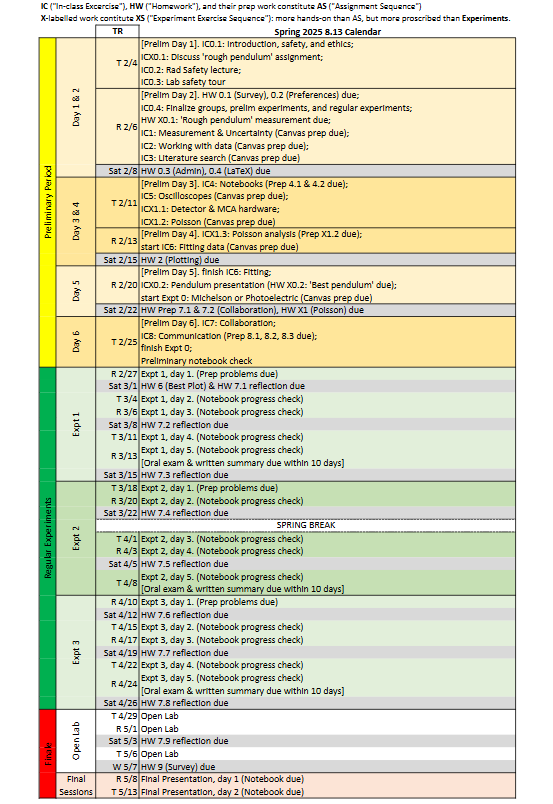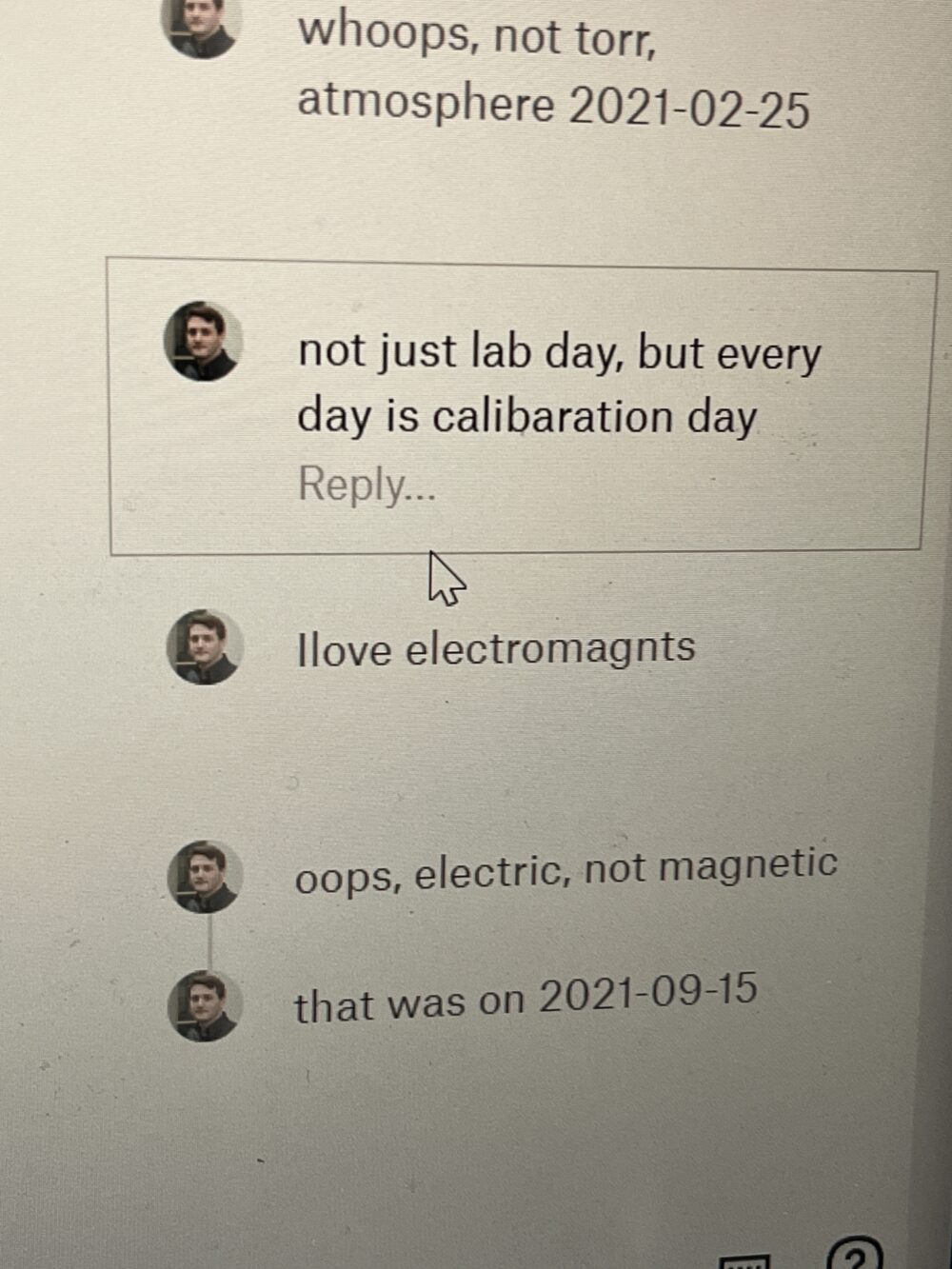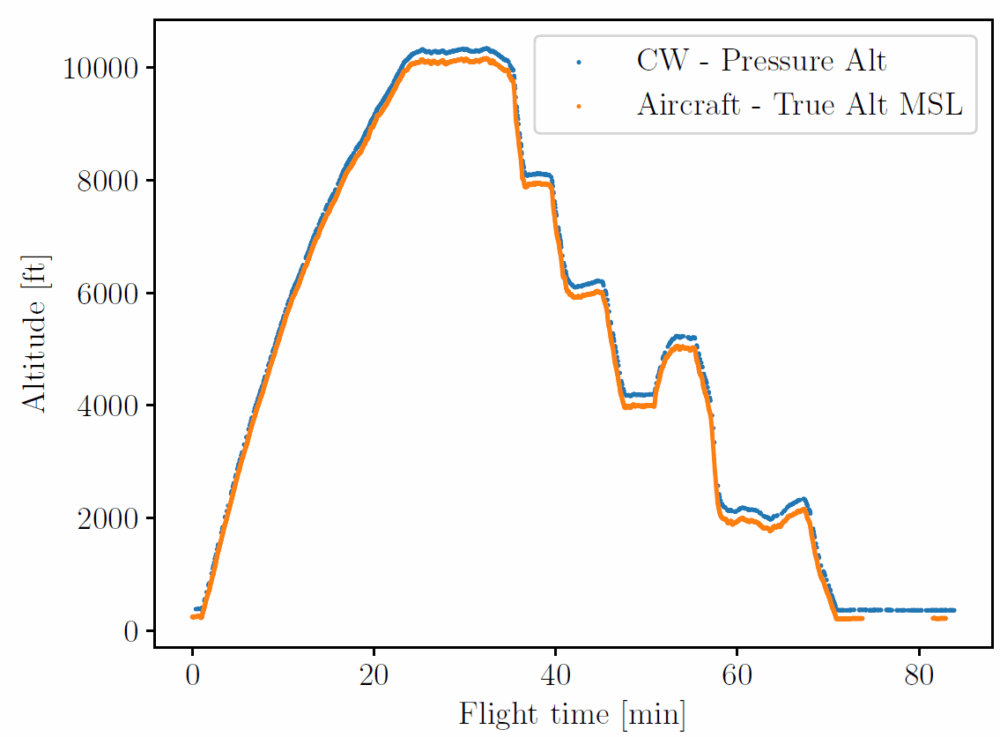
[Guest Post] This is Junior Lab, not Junior Theory by Ellie F. '28
By Jorian B. '25
8.13, or as it is more commonly known, Junior Lab or JLab, is the first experimental class in the “standard” 8 path. Most 8s take it Junior Fall01 hence the Junior in the name after >=3 semesters of theory classes.
The first few weeks (the Intro Period) are spent ensuring everyone has a common base of experimental skills. Practically, this means many small tasks in areas such as programming, statistics, LaTeX, and electronic equipment. You then do an “intro” experiment, either the Photoelectric Effect or Michelson Interferometry, which is a test-run for the workflow of a “full” experiment. For the intro experiment, there are only 3 hours of data collection (as opposed to the normal 15 hours) but you still give a full 15-minute presentation and write a 4-page paper. These are graded for completion! The format is hard the first time, but much easier the second so this is your chance to do paper and with no consequences if you miss the mark. The comments from your professor and your first practice will then make your first graded assignments go much smoother. Then, you choose two “full” experiments to work on for 5 lab sessions and write an associated paper + presentation (I did Johnson and shot noise and 21 cm radio astrophysics, two amazing experiments 10/10 I absolutely recommend). Everyone designs their own 3rd experiment using a pair of CosmicWatches, which measure muon flux. At the end, you polish your favorite presentation and give it in front of the whole class (not just the professor and TA) and any other people who might drop in.

Look at how much stuff is packed into the first three weeks. It is literally ⅓ of the calendar 😭
JLab has a bad reputation. It is a class that people hear about before they even declare physics. Some common phrases to describe it are “stressful,” “time sink,” “frustrating,” and “draining.” For some of us though, JLab is one of the best classes in the physics curriculum. I’m here to tell you why this class is amazing.

In the intro period, there is a discussion regarding what constitutes a good lab notebook.02 because physicists should maintain one There are several funny things in the sample notebooks03 including a gif of an owl swimming but this is my favorite part. First of all, every day is calibration day. Secondly, the phrase “I love electromagnets”04 a very understandable sentiment has three words in it. ‘I’ has one letter in it. Sean05 the fearless leader of the lab staff mispelled every word in that sentence, and I crack up every time I see this. Even your instructors make typos :)
This series of comments does kind of encompass JLab: mistakes, funny moments, and experimental physics.
JLab was the first place I felt I 100% belonged in physics. Coming into JLab, I was under the impression that most physicists were theorists. I didn’t think I was a “real” physics major because I liked hands-on work. As an engineering double major (in Course 16, AeroAstro), I cared about building things, testing, and troubleshooting. As far as I saw, physics majors cared about math, creating thought experiments06 which are exactly what they sound like; you imagine an experiment and then do the math , and the innate beauty of equations. I thought my interest in physics was that of an enthusiastic amateur but that I didn’t have the “right personality” to be a physicist.
Enter JLab. For the first time in 8, I saw myself in my instructors. My professor, TAs, and the lab staff were excited about hands-on work. They talked about real, imperfect systems, not idealized equations. Answers to my questions were grounded in observables. The weird effects from the design of each specific apparatus were considered important, not details to be brushed off because they’re not “fundamental.” One of my friends once described 8.0607 Quantum Mechanics III as “systems aren’t in equilibrium and how to cope with that.” In a similar vein, JLab is “systems aren’t isolated and how to cope with that.” It had always bothered me that physics PSETS seemed contrived. In JLab suddenly my professors wanted to talk about all the extraneous effects besides the theory being studied.
This was eye-opening: I misunderstood a huge portion of the profession. Experimental physics combined things I loved in both engineering and physics: it was hands-on and the driving question was “why” (whereas in engineering it is closer to “how”). Initially, I thought that they (the powers above in the physics department) had taken an engineering class and disguised it as a physics lab class because the activities in the intro period were so reminiscent of lab and design questions on my engineering PSETs. Engineering made JLab feel familiar.08 But they are not equivalent. Experimental physics approaches engineering, just as theoretical physics approaches math. It was amazing to learn that physicists care about the same things I do!
JLab09 I wanted to write a thank you section and the first draft came out sounding exactly like an acknowledgements section of a paper. JLab really did its job huh. The remainder of that is the first paragraph would not exist without the lab staff (Sean, Aaron, and Cory 10 and Oris. Good luck in grad school! ), professors (for me, Gunther and Christoph), TAs, and WRAP11 Writing, Rhetoric, and Professional Communication staff. The class is logistically very complex (see the calendar above), and they do a huge amount of work behind the scenes.
More importantly, they want you to learn. Lab staff and professors have, and continue to, think about the best way for students to spend their time. They are not giving you busy work or trying to make your life hard. If in doubt, ask what the purpose of an assignment is. There is always a purpose. In general, if in doubt, ask. The teaching team has answers to many questions both JLab-related and non-JLab-related.
In addition to being absurdly good at teaching, the people on the teaching team are just generally awesome! They care deeply for what they do, and a part of that is engaging with students. Go talk to them!!! Getting to hang out with cool people is also part of the fun! Go get advice and have interesting conversations and learn that they have pets and plants and opinions on trains.12 everyone loves trains. Unironically, my grad student friend group has a train-related discussion every few weeks
Back to the class……
I loved that the “end” of the experiment was poorly defined. The syllabus doesn’t say you must measure a quantity to a certain precision or include a certain number of calibrations to earn a certain grade. Rather, you must make a defensible measurement through performing an experiment. This ambiguity can be hard because you never really know if you’ve met expectations. Because of this, I defined success based on whether I felt satisfied with my results instead of based on grades. Feedback helped me calibrate “good enough” (this includes in uncertainty analysis, soft skills, paper layout, and so on) but my focus was on achieving a personal goal, not achieving an unknown benchmark for a grade. Since I defined the endpoint, I could justify my workaholic tendencies pouring a lot of time into the experiments. If I set the “end” then I was doing the work for myself, not for a grade or a class. And if it is for myself, why shouldn’t I put in as much time as I want?
For my favorite experiment (21 cm radio astrophysics), I realized that something was wrong with the instrument. I looked at a reference point and didn’t get the expected result. This bothered me immensely and I spent the next month constantly searching for the source of the error. My “endpoint” was when a calibration matched the expected result and I was going to keep working on the experiment until I achieved that. One time Sean asked me if I knew I didn’t have to continue trying to solve the calibration problems. I knew I didn’t have to do it for them. But I had to do it for myself. It was like an itch I couldn’t scratch.
The experiments felt like projects rather than assignments. This was great for me: I’ve always been far better at projects than exams. In a project, the end goal is broadly obvious, but the specific details to achieve that are up to me. In JLab, there was scaffolding in the lab manuals, but it was ultimately my project and therefore I could choose the direction to take it in. That was what I loved most about JLab: if I was willing to put in the extra work, I had the freedom to choose my own path. I could explore as many rabbit holes and do as many side quests as I wanted.
I was free to abandon the lab manual, and the lab staff would then support me with the new analysis. They didn’t say “oh that’s interesting, but is beyond the scope of this class,” provide me a rough answer, and tell me to do something else. I had to drive the direction of the analysis, but they were resources I could ask questions to, bounce ideas off of, and try to solve problems with. In any experiment, when I realized I was just spinning my wheels, they helped me find ways to keep moving forward.
Before I realized there was a problem with the radio telescope, I thought I was having a ~skill issue~ with basic algebra and geometry. I redid my math over and over again and could not find anything wrong (because I wasn’t wrong). I made all the lab staff check my math. I was ultimately met with “I don’t know.” Similarly in 8.14 (JLab II), I spent hours going back and forth with Oris about my analysis strategy for my exploratory project because I needed someone to brainstorm with. That was my favorite place to exist. I loved being so far off the “normal” path of the experiment that if I needed help, my instructors were equally as unsure as I was.
Interestingly, JLab also increased my interest in theory. For my Johnson and shot noise presentation, I brushed over the theory because I didn’t follow the derivation. Gunther was not happy with this and told me I needed a proper derivation in my paper. Unhappily, I went to go read the original paper. I followed the derivation, which was written in words not in equations, and when I had the “click” moment in the derivation I was so excited. I was telling my friends about it for days. For my next experiment, 21 cm radio astrophysics, I was then much more excited to delve into theory (which I didn’t because I had bigger fish to fry in addressing the calibration errors).
I loved asking about the engineering of the apparatuses because the explanation was always accompanied by an explanation of the underlying theory. These provided the justification to problems I had learned in theory classes. Having a tangible observable or piece of instrumentation that I want to understand means that I need to understand theory better.
In general, I need theory to fully interpret my experimental results. Theory helps guide what experiments are designed and it gives me the framework to separate confounding variables from the physics being studied. If I don’t understand what other things could be causing something, how do I know what is actually causing something? Experiment and theory are symbiotic and I didn’t realize I was missing half of that relationship before JLab.
This doesn’t make theory classes easier, though the physical and experimental intuition helps. Rather, it motivates the problems we study in theory classes. For example, take a point charge directly above a circular hole in a conducting plane. That’s not a practical problem. If I instead think of it as an electron on a straightaway before it goes through a velocity selector, suddenly I care.13 Why has someone chosen a metal? Why have they chosen a circle instead of a slit? I don’t know, those are their questionable decisions That is a practical problem. That is why I study physics. JLab gave me the background to reframe theory PSET problems into more practical problems which created a positive feedback loop between experiment and theory.
At times JLab was certainly “stressful,” “a time sink,” and “frustrating.” 14 never “draining” though. And to be fair, those words could be used to describe most classes here JLab was very different from anything I had done previously in physics. The path to success was not the same as in the other 8 classes so strategies I had grown accustomed to weren’t helpful. After all, it was Junior Lab, not Junior Theory.
But, for the first time in physics, the joy of learning didn’t come with a catch. I could put in more time and actually get better results. While I didn’t particularly enjoy the papers or presentations15 now I’m neutral; they are a necessary evil , they were infinitely preferable to a written exam. I was able to predict questions I’d be asked in my Q&A 16 my best prediction rate was ~40% in my first 8.14 presentation with Christoph and answer those I didn’t anticipate. I made plenty of mistakes in JLab (see the screenshots from my lab notebooks below), but they felt like a sign I was on the right track, rather than proof I was lost.
I gave an awful CosmicWatch presentation. It was horribly embarrassing to look Gunther, a particle physicist, in the eye and butcher an explanation of his field. He took the Q&A to explain how cosmic ray muons are produced (which should have been slide 0), gave a brief overview of particle physics, and said he disagreed with my major uncertainty calculation. It was mortifying, but rather than just brushing me off with a bad grade, he corrected me. The instructors’ critiques are a sign that they care. They are choosing to give you more of their time because they believe you can do better work. That’s the point. We make mistakes (sometimes huge ones) and in Junior Lab, we then go fix them.
You know what feedback I didn’t fix though? For every single paper and presentation in 8.13 (JLab), I received feedback to increase my font size on plot axes. One of the comments for my final paper was “Figures could still use somewhat larger labels.” Every time I’d think “that’s an easy fix, I’ll remember it” and then every time I’d forget.
I did remember to increase it for the first 8.14 presentation! Then Christoph said it wasn’t large enough. Rip. In 8.14 we have “experiment reviews” which are dry-runs of our half-baked presentations on the last lab day for an experiment. In the review for my second experiment, Christoph told me my font size was “perfect.” It was 4 points smaller than the one he said was too small the previous week. He said nothing about it in the subsequent presentation or in any of our lab presentations so it’s fine now, I suppose.
Conclusion: matplotlib 14 pt font is too small for Gunther, but 16 pt font is okay for Christoph. Default PowerPoint fonts are too small for Gunther but okay for Christoph. Except Christoph wants the slide numbers 2-4 pts larger.
Beyond genuinely enjoying being in lab every day, I got to do fun things like pour liquid nitrogen, work with a laser, and go up to the roof of 54. My camera roll has many, many, many JLab photos but here are some of my favorites!
And I’m not the only JLab enjoyer! Over the last year, I’ve been approached by other 8’s who want to tell someone about a cool thing they did in JLab or a funny interaction. I’ve had people tell me that taking JLab changed what part of physics they want to go into; it certainly changed my path. For all the voices loudly that this class isn’t fun, from what I can tell, there are just as many who enjoy it.
To future JLab students, I leave you with two final things.
Firstly, take 8.14!!! It takes the most fun parts of 8.13 (the experiments), adds a handful of miscellaneous assignments which have a very good time-in to usefulness-out ratio, AND has the exploratory project. The exploratory project is amazing because you get credit (and money) to do your own experiment. It is just messing around with a topic you are interested in and is SO MUCH FUN. Unlike 8.13, you don’t have a big learning curve at the start of 8.14 so the class is much more relaxed. The quality of my analysis improved dramatically in 8.14 because I could focus primarily on improving the depth and quality of my analysis without simultaneously trying to learn all the other not-strictly-technical-but-still-necessary skills in 8.13. And it is much easier to balance than 8.13. It is a ton of fun — I absolutely recommend it!!!
Second, please add quotes to the #quotes channel in the JLab Slack. It is unfortunately underutilized, and many funny things are said in lab. Here are a couple that aren’t there for inspiration:
“Is this a book of shadows or a grimoire? It’s a grimoire. It’s a grimoire.” – Sean holding a giant book of gamma ray emission lines
“I’m going to try to make a step function in your data” – my advisor to me in a plane while we were collecting CosmicWatch data 17 technically not in lab but still relevant

The flight path in question. See those big drops on the right? The nose of the plane was pointed frighteningly far down. The step function was achieved reasonably well though. Gunther did think this font was too small. Now I think the bigger problem is the serifs but oh well.
“I wonder why only terbium has wings…. maybe it’s because 18 Sophie V. ‘26 and Erin C. ‘26 together RED BULL GIVES YOU WINGS!!!!” – Erin, then together
“If Sean isn’t cooking, I don’t belong in the kitchen” – Cory
Happy experimenting!
- hence the Junior in the name back to text ↑
- because physicists should maintain one back to text ↑
- including a gif of an owl swimming back to text ↑
- a very understandable sentiment back to text ↑
- the fearless leader of the lab staff back to text ↑
- which are exactly what they sound like; you imagine an experiment and then do the math back to text ↑
- Quantum Mechanics III back to text ↑
- But they are not equivalent. Experimental physics approaches engineering, just as theoretical physics approaches math. back to text ↑
- I wanted to write a thank you section and the first draft came out sounding exactly like an acknowledgements section of a paper. JLab really did its job huh. The remainder of that is the first paragraph back to text ↑
- and Oris. Good luck in grad school! back to text ↑
- Writing, Rhetoric, and Professional Communication back to text ↑
- everyone loves trains. Unironically, my grad student friend group has a train-related discussion every few weeks back to text ↑
- Why has someone chosen a metal? Why have they chosen a circle instead of a slit? I don’t know, those are their questionable decisions back to text ↑
- never “draining” though. And to be fair, those words could be used to describe most classes here back to text ↑
- now I’m neutral; they are a necessary evil back to text ↑
- my best prediction rate was ~40% in my first 8.14 presentation with Christoph back to text ↑
- technically not in lab but still relevant back to text ↑
- Sophie V. ‘26 and Erin C. ‘26 together back to text ↑









